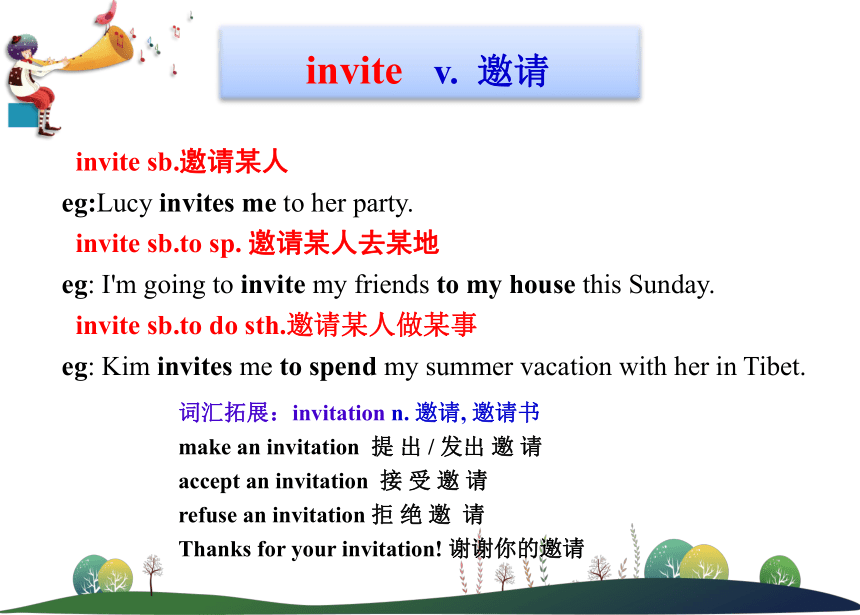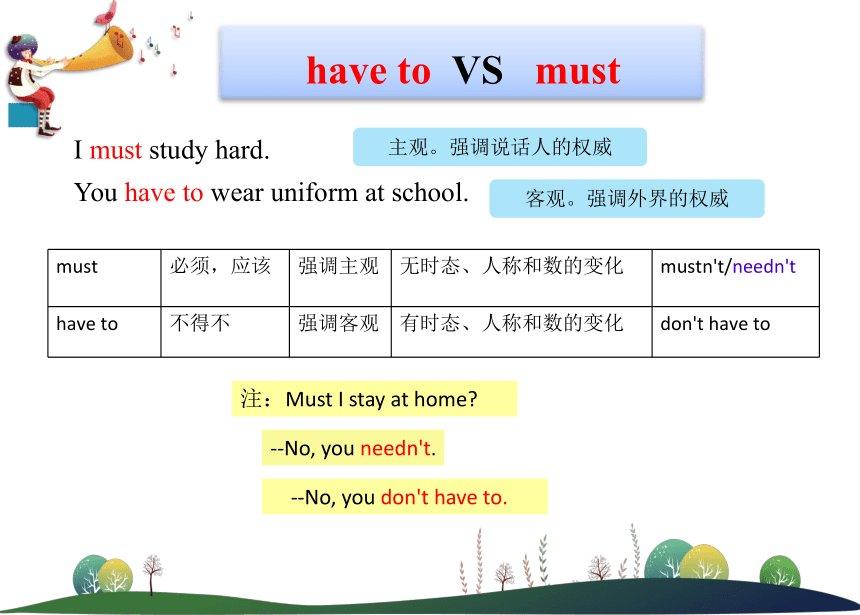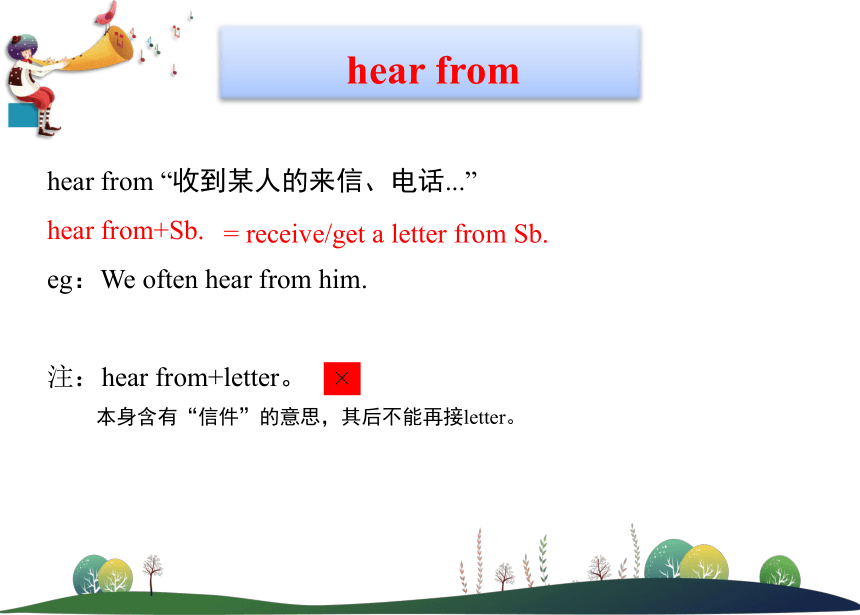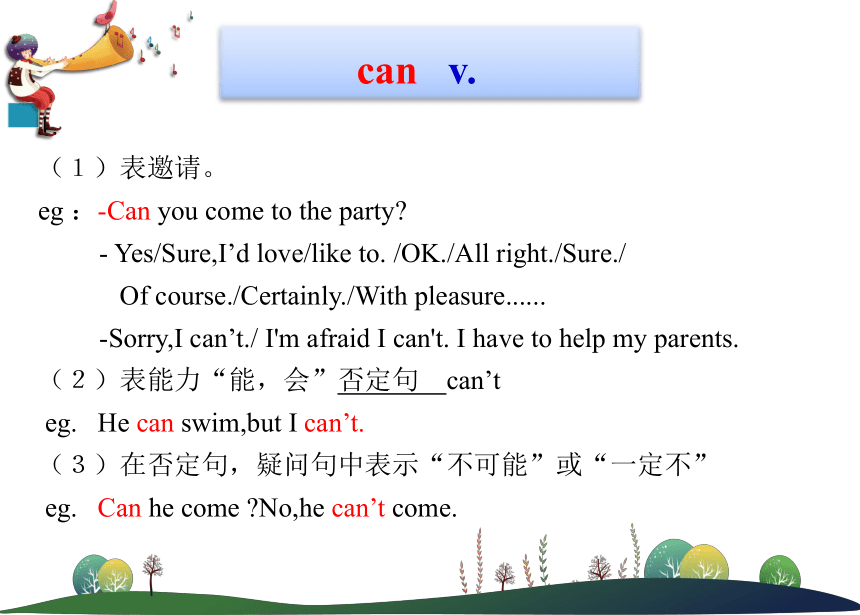Unit 9 Can you come to my party?知识点讲解课件19张
文档属性
| 名称 | Unit 9 Can you come to my party?知识点讲解课件19张 |  | |
| 格式 | zip | ||
| 文件大小 | 2.3MB | ||
| 资源类型 | 教案 | ||
| 版本资源 | 人教新目标(Go for it)版 | ||
| 科目 | 英语 | ||
| 更新时间 | 2021-09-04 08:04:12 | ||
图片预览







文档简介
(共19张PPT)
Unit
9
Can
you
come
to
my
party?
人教版
(Go
for
it)
八
年级上册
invite
sb.邀请某人
eg:Lucy
invites
me
to
her
party.
invite
sb.to
sp.
邀请某人去某地
eg:
I'm
going
to
invite
my
friends
to
my
house
this
Sunday.
invite
sb.to
do
sth.邀请某人做某事
eg:
Kim
invites
me
to
spend
my
summer
vacation
with
her
in
Tibet.
invite
v.
邀请
PART
03
词汇拓展:invitation
n.
邀请,
邀请书
make
an
invitation
提
出
/
发出
邀
请
accept
an
invitation
接
受
邀
请
refuse
an
invitation
拒
绝
邀
请
Thanks
for
your
invitation!
谢谢你的邀请
have
to
VS
must
PART
03
I
must
study
hard.
You
have
to
wear
uniform
at
school.
客观。强调外界的权威
主观。强调说话人的权威
must
必须,应该
强调主观
无时态、人称和数的变化
mustn't/needn't
have
to
不得不
强调客观
有时态、人称和数的变化
don't
have
to
注:Must
I
stay
at
home?
--No,
you
don't
have
to.
--No,
you
needn't.
available
adj.有空的;可获得的
1.指人时,译为“有空,有时间的”,后可用to
do引出具体的事情。
eg:I
am
available
to
come
to
work
tomorrow.
2.指物时,译为“可得到的,可利用的...”。
eg:Tea
is
available
in
this
hotel.
No
seats
available.
Is
the
room
available?
巧记available:available很害羞,修饰名词后边走。
available
adj.
PART
03
hear
from
“收到某人的来信、电话...”
hear
from+Sb.
eg:We
often
hear
from
him.
注:hear
from+letter。
hear
from
PART
03
×
本身含有“信件”的意思,其后不能再接letter。
=
receive/get
a
letter
from
Sb.
eg:
What's
today?
—It's
Monday
the
14th.
What's
today?
—It's
Teachers'
Day.
(1)
What's
the
date
today?
eg:
—What's
the
date
today?
—It's
September
10th.
What
day
is
it
today?。
eg:
—What
day
is
it
today?
—It's
Monday.
What's
today?
PART
03
星期几+the+序数词
What's
today?用来提问今天是几号、星期几。也可以用节日来回答.
回答的是日期.
回答的是星期几。
1.
(1)表邀请。
eg
:-Can
you
come
to
the
party?
-
Yes/Sure,I’d
love/like
to.
/OK./All
right./Sure./
Of
course./Certainly./With
pleasure......
-Sorry,I
can’t./
I'm
afraid
I
can't.
I
have
to
help
my
parents.
(2)表能力“能,会”否定句
can’t
eg.
He
can
swim,but
I
can’t.
(3)在否定句,疑问句中表示“不可能”或“一定不”
eg.
Can
he
come
?No,he
can’t
come.
can
v.
PART
03
PART
03
一、prepare及物动词
1).??prepare?sb.?sth.=prepare?sth.?for?sb.
"给......准备......"
?e.g.She?prepared?us?a?nice?breakfast.=?She?prepared?a?nice?breakfast?for?us.
2.).?prepare?sb.?for?sth.表示“使某人对某事有所准备”
例如:
She?said?so?because?she?wanted?to?prepare?her
father?for?the?bad?news.
?5).?prepare?to?do?sth.表示“准备做......”。
e.g.
They?were?preparing?to?cross?the?river
when?it?began?to?rain.?
二、prepare不及物动词
??prepare?for?sth.表示"为......做准备“
e.g.?The?students?are?busy?preparing?for?the?final?exam.
prepare
v.
PART
03
until
conj.&prep.
到……时;直到……为止
until
+延续性动词(肯定句),“直到……为止”。
其后可加名词(短语)作时间状语;或加句子,引导时间状语从句。
eg:
I
stayed
until
he
came
back.
not
+瞬间动词+
until
(否定句),意为“直到……才”。
如:go,come,finish,stop,open,close
等。
eg:I
didn't
go
to
school
until
my
mother
came
back.
eg:She
didn't
finish
her
homework
until
9
p.m.
until引导的时间状语从句中可用一般现在时表将来
I
shall
wait
here
until
he
arrives.
Alice
won't
leave
until
her
father
comes.
until
v.
PART
03
hang
out
闲逛/常去某处;泡在某处
eg:Where
do
you
hang
out
these
days?
hang的规则与不规则形式:
hang(悬挂)—hung—hung;
hang(绞死)—hanged—hanged
eg:
The
teacher
hung
the
English
alphabet
on
the
wall.
The
criminal
was
hanged.罪犯被处以绞刑。
hang的过去式巧记:规则的绞死
不规则的挂
hang
out
PART
03
catch
you
on
Monday.
周一见
catch(V.)及时赶上,接住,抓住
eg:He
started
late,
but
he
was
able
to
catch
the
8
o'clock
train.
catch
up
with
sb.赶上某人
eg:Please
slow
down,I
can't
catch
up
with
you.
catch
a
cold
感冒
eg:Tom
didn't
go
to
school
yesterday,because
he
caught
a
cold.
catch
v.
PART
03
accept
/?k'sept/
v.接受
eg:
I
received
his
gift
yesterday,but
I
didn’t
accept
it.
receive(客观上)收到
accept(主观上)接受
accept
意为“接受”,主观上愿意接受。
receive
意为“收到”,指客观上收到或
拿到,但主观上不一定会接受。
accept
v.
PART
03
refuse
v.
拒绝
refuse
sb./sth.
拒绝某人/某物
eg:I
don't
think
he
will
refuse
me.我想他不会拒绝我。
She
refused
their
invitation.
她拒绝了他们的邀请。
refuse
v.
PART
03
reply
v.&n.
回答;答复
reply作不及物动词,意为“回复”。
reply
to...(with...)(以……)对……作出回复。
词条
含义及用法
例句
answer
及物动词,意为“回答”。多用于“回答问题(answer
the
question)”或“接电话(answer
the
telephone)”等。
Can
you
answer
my
question?
你能回答我的问题吗?
reply
reply比answer正式,一般指经过思考、有针对性地回答。reply不能直接带宾语,要加to,
即reply
to=answer。
He
never
replied
to
any
of
my
letters.
他从来不回我的任何信。
reply
PART
03
the
best
way
to
do做……的最好方法。
动词不定式(to
do)作后置定语,修饰前面的名词。
eg:The
best
way
to
learn
English
is
to
use
it.
the
best
way
to
do
PART
03
to
visit
my
aunt
and
uncle为动词不定式短语作目的状语。
eg:We
are
taking
a
trip
to
Shanghai
to
see
our
grandparents
the
day
after
tomorrow.
有时可以把不定式(短语)提前,放于句首,强调目的。
eg:To
learn
English
quickly
and
well,
he
went
to
England.
without“没有”,介词,后可+名/V-ing/代词
Nothing
can
live
without
water.
She
went
out
without
saying
a
word.
I
can't
live
without
you.
用于否定句,表示条件,可=if引导的否定条件句
We
can't
finish
the
work
without
your
help.
We
can't
finish
the
work
if
you
don't
help
us.
without
v.
PART
03
so
that
为了;以便
so
that在此引导目的状语从句,从句中通常用may(might)或can(could)等情态动词。
eg:We
learn
English
so
that
we
may
get
more
knowledge.
当so
that
从句的主语和主句的主语一致时,可用in
order
to
或不定式短语替换从句的开始部分,其意义基本不变。
eg:
他们早起以便能够赶上第一班公交车。
They
got
up
early
so
that
they
could
catch
the
first
bus.
→They
got
up
early
in
order
to
catch
the
first
bus.
→They
got
up
early
to
catch
the
first
bus.
so
that
多表目
的;表
结果
She
worked
hard
so
that
everything
would
be
ready
in
time.
so...
that...
表结果
She
spoke
so
quietly
that
I
could
hardly
hear
her.
so
that
PART
03
look
forward
to+n/ving
盼望;期望”
eg:
The
students
are
looking
forward
to
an
English
party.
I
look
forward
to
hearing
from
you
all.
look
forward
to
和
expect
二者都可意为“期待”,区别如下:
(1)
look
forward
to指带着愉快的心情期待某事的发生
eg:The
students
are
looking
forward
to
their
holiday.
(2)expect指确信某事必将发生,多用于好的事物,也可用于不好的事物。
eg:I
didn't
expect
to
meet
you
here.
look
forward
v.
PART
03
向前地
Please
reply
in
writing
to
this
invitation
by
Friday,
December
20th.
1)reply
in
writing
表示“
以书面的形式进行回复”。其中reply相当于
answer,但要比后者更加书面化且正式许多。此处介词in表示方式,相当于汉语“
用……方式(形式)”之意。
2)reply作动词时,不直接跟宾语,须由介词to
引入宾语内容,构成
reply
to
…
的结构。如:
Did
you
reply
to
these
letter?你回复这些来信了吗?
3)在此句中,介词by
译为“
截止……;
…..之前到……为止”。介词before
也有“……之前”之意,但区别于before不包含其后的时间,
而
by
则包括。
e.g.
You
should
get
your
homework
ready
by
Friday.
Remember:
Friday
is
the
last
day!
Can
you
come
and
meet
me
before
Friday?
I’ll
be
away
early
Friday
morning.
Unit
9
Can
you
come
to
my
party?
人教版
(Go
for
it)
八
年级上册
invite
sb.邀请某人
eg:Lucy
invites
me
to
her
party.
invite
sb.to
sp.
邀请某人去某地
eg:
I'm
going
to
invite
my
friends
to
my
house
this
Sunday.
invite
sb.to
do
sth.邀请某人做某事
eg:
Kim
invites
me
to
spend
my
summer
vacation
with
her
in
Tibet.
invite
v.
邀请
PART
03
词汇拓展:invitation
n.
邀请,
邀请书
make
an
invitation
提
出
/
发出
邀
请
accept
an
invitation
接
受
邀
请
refuse
an
invitation
拒
绝
邀
请
Thanks
for
your
invitation!
谢谢你的邀请
have
to
VS
must
PART
03
I
must
study
hard.
You
have
to
wear
uniform
at
school.
客观。强调外界的权威
主观。强调说话人的权威
must
必须,应该
强调主观
无时态、人称和数的变化
mustn't/needn't
have
to
不得不
强调客观
有时态、人称和数的变化
don't
have
to
注:Must
I
stay
at
home?
--No,
you
don't
have
to.
--No,
you
needn't.
available
adj.有空的;可获得的
1.指人时,译为“有空,有时间的”,后可用to
do引出具体的事情。
eg:I
am
available
to
come
to
work
tomorrow.
2.指物时,译为“可得到的,可利用的...”。
eg:Tea
is
available
in
this
hotel.
No
seats
available.
Is
the
room
available?
巧记available:available很害羞,修饰名词后边走。
available
adj.
PART
03
hear
from
“收到某人的来信、电话...”
hear
from+Sb.
eg:We
often
hear
from
him.
注:hear
from+letter。
hear
from
PART
03
×
本身含有“信件”的意思,其后不能再接letter。
=
receive/get
a
letter
from
Sb.
eg:
What's
today?
—It's
Monday
the
14th.
What's
today?
—It's
Teachers'
Day.
(1)
What's
the
date
today?
eg:
—What's
the
date
today?
—It's
September
10th.
What
day
is
it
today?。
eg:
—What
day
is
it
today?
—It's
Monday.
What's
today?
PART
03
星期几+the+序数词
What's
today?用来提问今天是几号、星期几。也可以用节日来回答.
回答的是日期.
回答的是星期几。
1.
(1)表邀请。
eg
:-Can
you
come
to
the
party?
-
Yes/Sure,I’d
love/like
to.
/OK./All
right./Sure./
Of
course./Certainly./With
pleasure......
-Sorry,I
can’t./
I'm
afraid
I
can't.
I
have
to
help
my
parents.
(2)表能力“能,会”否定句
can’t
eg.
He
can
swim,but
I
can’t.
(3)在否定句,疑问句中表示“不可能”或“一定不”
eg.
Can
he
come
?No,he
can’t
come.
can
v.
PART
03
PART
03
一、prepare及物动词
1).??prepare?sb.?sth.=prepare?sth.?for?sb.
"给......准备......"
?e.g.She?prepared?us?a?nice?breakfast.=?She?prepared?a?nice?breakfast?for?us.
2.).?prepare?sb.?for?sth.表示“使某人对某事有所准备”
例如:
She?said?so?because?she?wanted?to?prepare?her
father?for?the?bad?news.
?5).?prepare?to?do?sth.表示“准备做......”。
e.g.
They?were?preparing?to?cross?the?river
when?it?began?to?rain.?
二、prepare不及物动词
??prepare?for?sth.表示"为......做准备“
e.g.?The?students?are?busy?preparing?for?the?final?exam.
prepare
v.
PART
03
until
conj.&prep.
到……时;直到……为止
until
+延续性动词(肯定句),“直到……为止”。
其后可加名词(短语)作时间状语;或加句子,引导时间状语从句。
eg:
I
stayed
until
he
came
back.
not
+瞬间动词+
until
(否定句),意为“直到……才”。
如:go,come,finish,stop,open,close
等。
eg:I
didn't
go
to
school
until
my
mother
came
back.
eg:She
didn't
finish
her
homework
until
9
p.m.
until引导的时间状语从句中可用一般现在时表将来
I
shall
wait
here
until
he
arrives.
Alice
won't
leave
until
her
father
comes.
until
v.
PART
03
hang
out
闲逛/常去某处;泡在某处
eg:Where
do
you
hang
out
these
days?
hang的规则与不规则形式:
hang(悬挂)—hung—hung;
hang(绞死)—hanged—hanged
eg:
The
teacher
hung
the
English
alphabet
on
the
wall.
The
criminal
was
hanged.罪犯被处以绞刑。
hang的过去式巧记:规则的绞死
不规则的挂
hang
out
PART
03
catch
you
on
Monday.
周一见
catch(V.)及时赶上,接住,抓住
eg:He
started
late,
but
he
was
able
to
catch
the
8
o'clock
train.
catch
up
with
sb.赶上某人
eg:Please
slow
down,I
can't
catch
up
with
you.
catch
a
cold
感冒
eg:Tom
didn't
go
to
school
yesterday,because
he
caught
a
cold.
catch
v.
PART
03
accept
/?k'sept/
v.接受
eg:
I
received
his
gift
yesterday,but
I
didn’t
accept
it.
receive(客观上)收到
accept(主观上)接受
accept
意为“接受”,主观上愿意接受。
receive
意为“收到”,指客观上收到或
拿到,但主观上不一定会接受。
accept
v.
PART
03
refuse
v.
拒绝
refuse
sb./sth.
拒绝某人/某物
eg:I
don't
think
he
will
refuse
me.我想他不会拒绝我。
She
refused
their
invitation.
她拒绝了他们的邀请。
refuse
v.
PART
03
reply
v.&n.
回答;答复
reply作不及物动词,意为“回复”。
reply
to...(with...)(以……)对……作出回复。
词条
含义及用法
例句
answer
及物动词,意为“回答”。多用于“回答问题(answer
the
question)”或“接电话(answer
the
telephone)”等。
Can
you
answer
my
question?
你能回答我的问题吗?
reply
reply比answer正式,一般指经过思考、有针对性地回答。reply不能直接带宾语,要加to,
即reply
to=answer。
He
never
replied
to
any
of
my
letters.
他从来不回我的任何信。
reply
PART
03
the
best
way
to
do做……的最好方法。
动词不定式(to
do)作后置定语,修饰前面的名词。
eg:The
best
way
to
learn
English
is
to
use
it.
the
best
way
to
do
PART
03
to
visit
my
aunt
and
uncle为动词不定式短语作目的状语。
eg:We
are
taking
a
trip
to
Shanghai
to
see
our
grandparents
the
day
after
tomorrow.
有时可以把不定式(短语)提前,放于句首,强调目的。
eg:To
learn
English
quickly
and
well,
he
went
to
England.
without“没有”,介词,后可+名/V-ing/代词
Nothing
can
live
without
water.
She
went
out
without
saying
a
word.
I
can't
live
without
you.
用于否定句,表示条件,可=if引导的否定条件句
We
can't
finish
the
work
without
your
help.
We
can't
finish
the
work
if
you
don't
help
us.
without
v.
PART
03
so
that
为了;以便
so
that在此引导目的状语从句,从句中通常用may(might)或can(could)等情态动词。
eg:We
learn
English
so
that
we
may
get
more
knowledge.
当so
that
从句的主语和主句的主语一致时,可用in
order
to
或不定式短语替换从句的开始部分,其意义基本不变。
eg:
他们早起以便能够赶上第一班公交车。
They
got
up
early
so
that
they
could
catch
the
first
bus.
→They
got
up
early
in
order
to
catch
the
first
bus.
→They
got
up
early
to
catch
the
first
bus.
so
that
多表目
的;表
结果
She
worked
hard
so
that
everything
would
be
ready
in
time.
so...
that...
表结果
She
spoke
so
quietly
that
I
could
hardly
hear
her.
so
that
PART
03
look
forward
to+n/ving
盼望;期望”
eg:
The
students
are
looking
forward
to
an
English
party.
I
look
forward
to
hearing
from
you
all.
look
forward
to
和
expect
二者都可意为“期待”,区别如下:
(1)
look
forward
to指带着愉快的心情期待某事的发生
eg:The
students
are
looking
forward
to
their
holiday.
(2)expect指确信某事必将发生,多用于好的事物,也可用于不好的事物。
eg:I
didn't
expect
to
meet
you
here.
look
forward
v.
PART
03
向前地
Please
reply
in
writing
to
this
invitation
by
Friday,
December
20th.
1)reply
in
writing
表示“
以书面的形式进行回复”。其中reply相当于
answer,但要比后者更加书面化且正式许多。此处介词in表示方式,相当于汉语“
用……方式(形式)”之意。
2)reply作动词时,不直接跟宾语,须由介词to
引入宾语内容,构成
reply
to
…
的结构。如:
Did
you
reply
to
these
letter?你回复这些来信了吗?
3)在此句中,介词by
译为“
截止……;
…..之前到……为止”。介词before
也有“……之前”之意,但区别于before不包含其后的时间,
而
by
则包括。
e.g.
You
should
get
your
homework
ready
by
Friday.
Remember:
Friday
is
the
last
day!
Can
you
come
and
meet
me
before
Friday?
I’ll
be
away
early
Friday
morning.
同课章节目录
- Unit 1 Where did you go on vacation?
- Section A
- Section B
- Unit 2 How often do you exercise?
- Section A
- Section B
- Unit 3 I'm more outgoing than my sister.
- Section A
- Section B
- Unit 4 What's the best movie theater?
- Section A
- Section B
- Unit 5 Do you want to watch a game show?
- Section A
- Section B
- Unit 6 I'm going to study computer science.
- Section A
- Section B
- Unit 7 Will people have robots?
- Section A
- Section B
- Unit 8 How do you make a banana milk shake?
- Section A
- Section B
- Unit 9 Can you come to my party?
- Section A
- Section B
- Unit 10 If you go to the party, you'll have a grea
- Section A
- Section B
